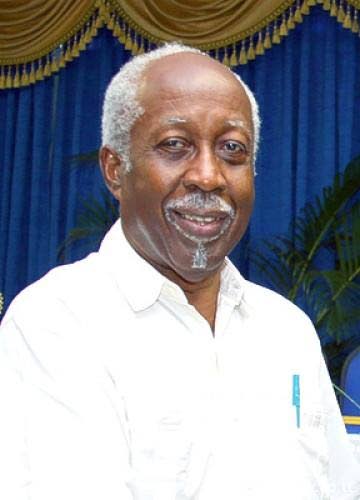My friend Gérard Latortue

REGINALD DUMAS
ANOTHER FRIEND has died. This time it’s Gérard Latortue, unknown in TT, who in 2004 became the interim prime minister of Haiti after the exiling of the constitutionally elected president, Jean-Bertrand Aristide, and the dissolution of his government.
Things hadn’t been going well in Haiti (though not as chaotically as today). A populist and a nationalist, but a poor leader, Aristide was deepening internal socio-economic divisions; politically, even left-wingers were now hostile. Externally, he was discomfiting the USA (remember the Monroe Doctrine?) and considerably irritating the French by calling for reparations (he calculated the French debt to Haiti at US$21,685,155,571. And 48 cents, which Haitian comedians said were for the people).
The two powers decided he had to go. This is Dominique de Villepin, the French foreign minister, writing about him: “(H)e bears heavy responsibility for the current situation…Everyone sees quite well that a new page must be opened in Haiti’s history…” How would you interpret that second sentence?
And the US secretary of state Colin Powell wasn’t far behind: yes, he agreed that Aristide had been elected democratically, but he hadn’t governed democratically. How would you interpret that?
Out went Aristide; the Americans even had a plane waiting for him at Port-au-Prince airport. He was flown to the Central African Republic, and a bland announcement was made to the effect that he had resigned and left his country. Voluntarily, of course. In came Latortue, a Haitian living in Florida. At least one Aristide Cabinet minister, Leslie Voltaire, supported him: he was “a pacifist, a good person, a man of compromise…I think he is both (independent and professionally competent).”
That wasn’t at all how Caricom saw him. For the organisation, he was an interloper, a Franco-US puppet illegally replacing the real captain of Haiti, Aristide. Not that Caricom was totally pleased with Aristide; it had in fact been voicing unhappiness with his governance. It had drawn up a Plan of Action for Haiti, which the international community, France and the USA included, had endorsed.
Caricom’s point man for overseeing the implementation of the plan was the Jamaican PM, PJ Patterson, who, with the rest of his colleagues, reacted with fury to Aristide’s removal. I found myself in the middle of the brouhaha. Just a few days before Aristide’s overthrow, I had been appointed the special adviser on Haiti to the then UN secretary-general, the late Kofi Annan; I was looking forward to meeting Aristide. But Aristide was suddenly gone, and although Caricom welcomed my appointment, I was faced with a new and politically very delicate scenario.
I survived. When my six-month contract was nearly up, Latortue told me and the UN he wanted me to continue; he rejected the person nominated as my successor. But I had originally told Annan I would stay for only six months, and I stuck to that. I was still prepared to help, but from a distance.
I kept in touch with Latortue, who soldiered on. As Leslie Voltaire had said, he was a good person. He made mistakes (who doesn’t?), but he wanted the best for his country. I wrote this about him in my 2008 book on my Haiti experience:
“Mauled throughout his tenure, often by his former supporters, always by those who saw him as the illegitimate rag doll of the Bush administration, he nonetheless presided over a free, if not wholly fair, presidential election and an orderly transfer of power to the incoming Préval administration. No stranger to self-inflicted injury, he was just the same largely trapped between competing forces and interests over which, unelected and a ‘foreigner’ from Florida with much perceived international baggage, he could exercise little moral authority...
“But whether one wants to accept it or not, his administration did achieve a great deal on the ground, as is made clear in the Livre Blanc (White Paper) covering the period March 9, 2004 to June 9, 2006. It is a monumental document, running to 545 pages plus annexes, which describes the activities of the various ministries over the biennium. The introduction says it is not a publicity stunt but, above all, a reference work, the first of its kind in Haiti. It even contains suggestions for the country’s new leaders.”
These days, one isn’t sure that Haiti has any leaders, unless you count those who control the increasingly violent gangs. The country has descended into anarchy. Whatever the extent of foreign interference and subversion – and it has been massive – this is not what Toussaint L’Ouverture and Jean-Jacques Dessalines fought for. It is the polar opposite of what Gérard Latortue, with his careful, turtle-step approach, envisaged and worked towards.
May he rest in peace. May Haiti recover peace.

Comments
"My friend Gérard Latortue"